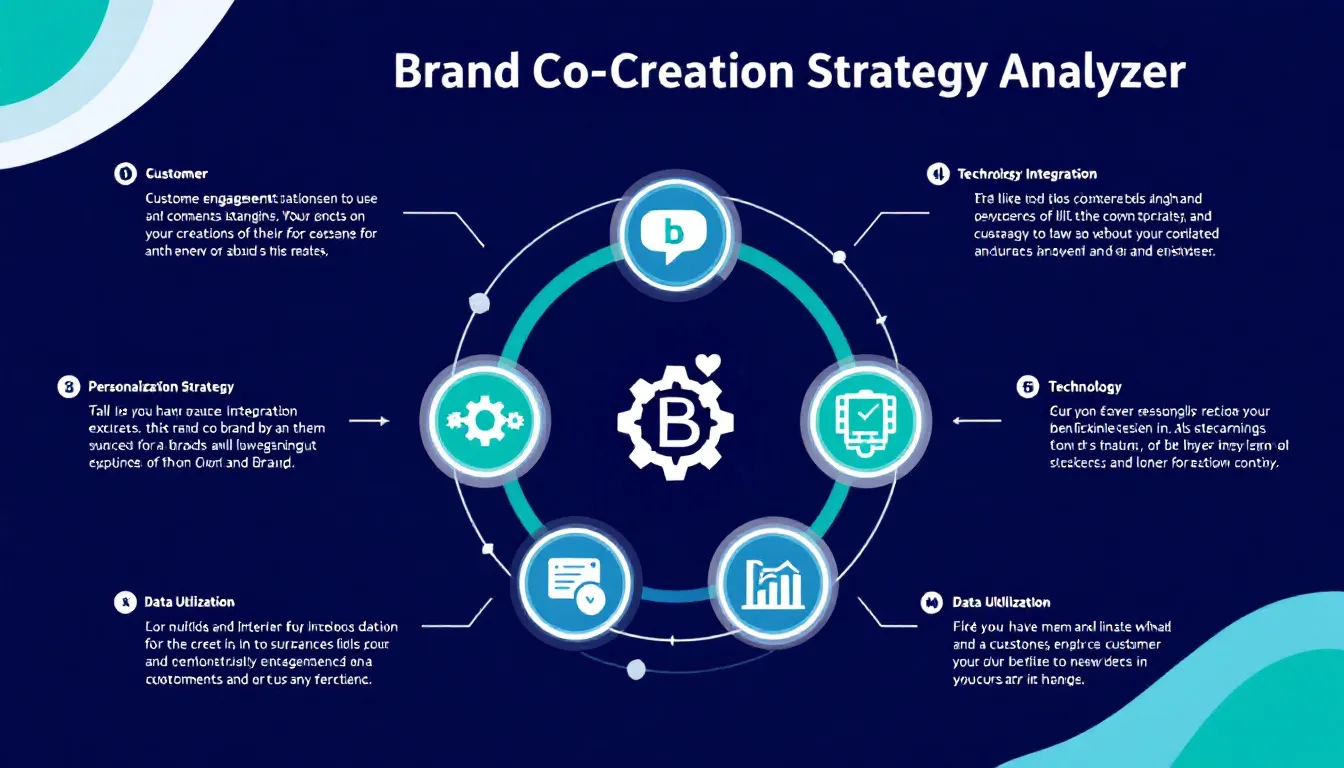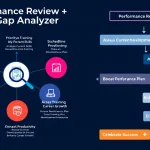Is this tool helpful?
How to Use the Brand Co-Creation Strategy Analyzer
The Brand Co-Creation Strategy Analyzer is designed to evaluate and enhance your brand’s collaborative and personalization efforts. Follow these steps to get a comprehensive analysis:
- Brand Name: Enter your company name (e.g., “Starbucks” or “Samsung”)
- Industry Sector: Specify your primary industry (e.g., “Food & Beverage” or “Consumer Electronics”)
- Current Strategies: Detail your existing co-creation initiatives and personalization approaches
- Customer Base Description: Outline your target audience demographics and characteristics
- Technology Stack: List your current technological tools and data management systems
Understanding Brand Co-Creation and Personalization Analysis
Brand co-creation represents a fundamental shift in how companies interact with their customers, moving from a traditional one-way communication model to a collaborative partnership approach. This analyzer evaluates your current strategies and provides actionable insights for improvement.
Core Components of the Analysis
- Customer Engagement Assessment
- Personalization Strategy Evaluation
- Technology Integration Analysis
- Data Utilization Metrics
- Scalability Potential
Benefits of Using the Brand Co-Creation Strategy Analyzer
1. Strategic Insight Generation
The analyzer provides detailed insights into your current co-creation efforts, highlighting strengths and identifying areas for improvement. It evaluates your brand’s ability to foster meaningful customer collaboration and deliver personalized experiences.
2. Competitive Advantage Development
By analyzing your co-creation strategies, you can identify unique opportunities to differentiate your brand through enhanced customer collaboration and personalization initiatives.
3. Resource Optimization
The tool helps optimize resource allocation by identifying the most effective co-creation channels and personalization techniques for your specific industry and target audience.
Real-World Applications and Examples
Example 1: Retail Brand Analysis
A clothing retailer using the analyzer might input:
- Brand Name: Fashion Forward
- Industry: Retail Fashion
- Current Strategies: Customer design contests, size recommendation engine
- Customer Base: Fashion-conscious millennials, ages 25-40
- Technology: AI-powered recommendation system, social media integration
Example 2: Technology Company Analysis
A software company might input:
- Brand Name: CloudTech Solutions
- Industry: Enterprise Software
- Current Strategies: User feedback forums, beta testing program
- Customer Base: Small to medium-sized businesses
- Technology: Machine learning algorithms, customer feedback platform
Key Performance Metrics
The analyzer evaluates several critical metrics:
$$ \text{Customer Engagement Score} = \frac{\text{Active Participants}}{\text{Total Customer Base}} \times \text{Interaction Depth} $$$$ \text{Personalization Effectiveness} = \frac{\text{Personalized Interactions}}{\text{Total Interactions}} \times \text{Success Rate} $$Implementation Strategies
Short-term Implementation
- Customer feedback integration
- Basic personalization features
- Social media engagement
- User testing programs
Long-term Implementation
- Advanced AI implementation
- Predictive analytics
- Omnichannel personalization
- Community-driven innovation
Industry-Specific Considerations
Retail Sector
Focus on product customization, customer feedback loops, and personalized shopping experiences.
Technology Sector
Emphasize user testing, feature co-development, and adaptive user interfaces.
Service Industry
Prioritize customer experience personalization and service customization options.
Frequently Asked Questions
Q: What makes a successful co-creation strategy?
A successful co-creation strategy combines meaningful customer engagement, clear value proposition, and effective implementation of customer insights into product or service development.
Q: How often should I analyze my co-creation strategies?
Quarterly analysis is recommended to maintain competitive advantage and adapt to changing customer needs.
Q: What are the key elements of effective personalization?
Effective personalization includes data-driven insights, real-time adaptation, and seamless integration across all customer touchpoints.
Q: How can I improve customer participation in co-creation?
Enhance engagement through incentive programs, transparent communication, and demonstrating the impact of customer contributions.
Q: What role does technology play in co-creation?
Technology enables scalable personalization, data analysis, and efficient customer collaboration platforms.
Best Practices for Strategy Implementation
1. Customer Engagement
- Regular feedback collection
- Transparent communication
- Clear value proposition
- Incentive alignment
2. Technology Integration
- Data analytics implementation
- Automation of personalization
- Customer interface optimization
- Security measures
3. Measurement and Optimization
- KPI tracking
- Regular performance review
- Strategy adjustment
- ROI analysis
Future Trends in Co-Creation and Personalization
Emerging Technologies
- AI-driven personalization
- Blockchain for transparency
- IoT integration
- Virtual reality collaboration
Consumer Behavior Shifts
- Increased demand for customization
- Privacy-conscious engagement
- Community-driven development
- Sustainable co-creation
Important Disclaimer
The calculations, results, and content provided by our tools are not guaranteed to be accurate, complete, or reliable. Users are responsible for verifying and interpreting the results. Our content and tools may contain errors, biases, or inconsistencies. We reserve the right to save inputs and outputs from our tools for the purposes of error debugging, bias identification, and performance improvement. External companies providing AI models used in our tools may also save and process data in accordance with their own policies. By using our tools, you consent to this data collection and processing. We reserve the right to limit the usage of our tools based on current usability factors. By using our tools, you acknowledge that you have read, understood, and agreed to this disclaimer. You accept the inherent risks and limitations associated with the use of our tools and services.







